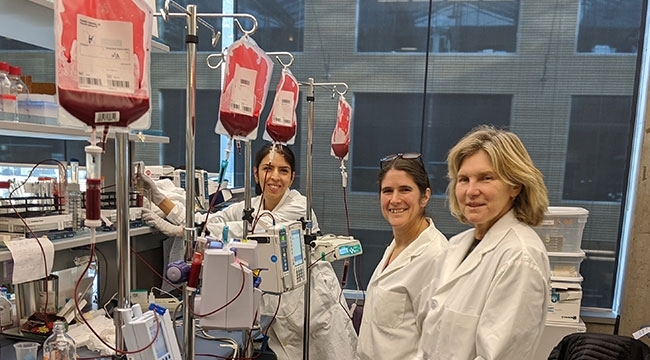By Abby Wolfe, Knowledge Mobilization Coordinator, Canadian Blood Services
Originally posted on the Canadian Blood Services Research, Education, and Discovery (R.E.D.) blog and republished with permission and minor edits. Read the original article.
A study involving Centre for Blood Research and Canadian Blood Services researchers Dr. Narges Hadjesfandiari, research associate, and Dr. Dana Devine, chief scientist, is helping to answer questions about the effect of infusion pumps on red blood cells (RBC) and make it easier to evaluate the safety of these pumps for this use. Published in Transfusion, the Journal of AABB, this research is now summarized in a new Canadian Blood Services Research Unit.
Infusion pumps are mechanical devices commonly used in transfusion medicine that were originally designed to administer fluid resuscitation products, like saline and other crystalloids. Due to their ability to speed up transfusion times, provide increased accuracy in infused product volume, and decrease the risk of errors compared to gravity-based infusions, these infusion pumps have also come to be used in the transfusion of blood products like red blood cells. This has raised questions about whether red blood cells – the tiny, disc-shaped structures that carry oxygen in blood – might sustain mechanical damage when they are exposed to the pumps.

Dr. Narges Hadjesfandiari, Dr. Katherine Serrano and Dr. Elena Levin are pictured in Dr. Dana Devine’s lab at the Centre for Blood Research. Image courtesy of Canadian Blood Services.
The study tested four types of infusion pumps currently approved in Canada using different types of RBC units. The RBC units were put through the pumps at varying rates then inspected for changes in measures of RBC quality. After analyzing the pumps’ effects on the RBCs and concluding that all pumps tested were considered safe for use based on national and international standards, the researchers acknowledged that there is potential for these measures to inform the future evaluation of infusion pumps by blood suppliers, manufacturers and health-care facilities.

Dr. Andrew Shih
According to Dr. Andrew Shih, regional medical leader, transfusion medicine at Vancouver Coastal Health Authority and co-investigator on this study, research like this can be invaluable to hospitals. “This research used a comprehensive testing strategy, mimicking scenarios that are clinically relevant. It has informed our policy in Vancouver General Hospital and could inform a new framework for regulatory bodies to evaluate the safety of future infusion pumps introduced into the market, by building upon standards that have already been introduced.”
- Want to learn more? Read about the Research Unit on the Canadian Blood Services’s website: Evaluating infusion pump safety for red blood cell transfusions | Canadian Blood Services
- Read the paper published in Transfusion: “Effect of modern infusion pumps on RBC quality”


